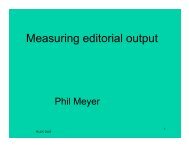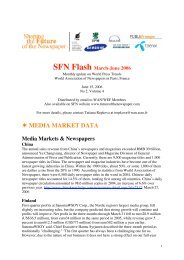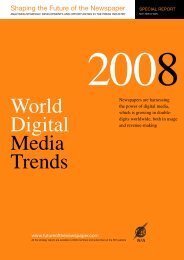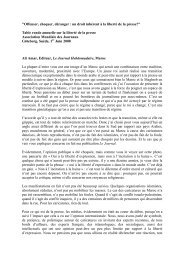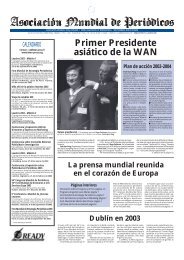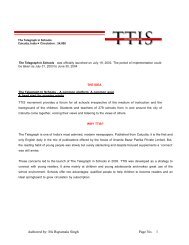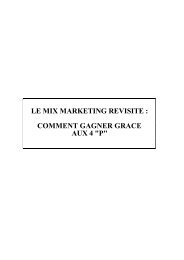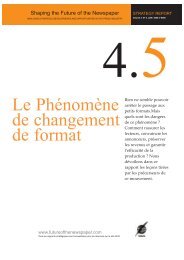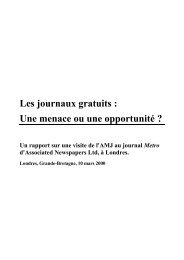WORLD PRESS TRENDS - World Association of Newspapers
WORLD PRESS TRENDS - World Association of Newspapers
WORLD PRESS TRENDS - World Association of Newspapers
You also want an ePaper? Increase the reach of your titles
YUMPU automatically turns print PDFs into web optimized ePapers that Google loves.
GERMANY<br />
In the press sector, a planned merger must be declared in<br />
advance when the turnover reaches a minimum level, which<br />
ranges from Euro 26 million to Euro 51 million depending on<br />
circumstances. This duty to declare does not however enable<br />
the cartel authorities to exert power over or to forbid the merger.<br />
Otherwise, it would imply that all such agreements would<br />
favour or reinforce a pre-eminent position in the market, which<br />
is what the regulations are designed to prevent. There is a legal<br />
presumption that a one-third market share is pre-eminent,<br />
rebuttable with evidence that the annual turnover <strong>of</strong> the<br />
company concerned is less than Euro 128 million, or in the press<br />
sector, Euro 6 million. The creation <strong>of</strong> an oligopoly, when only<br />
a small number <strong>of</strong> suppliers operate in a market, is presumed<br />
in the press industry when the turnover reaches Euro 2.5 million.<br />
Mergers are permissible if the companies can show that<br />
competition is actually being increased, but few succeed with<br />
this argument. Companies have the right to appeal against<br />
decisions to the Federal Ministry <strong>of</strong> Economy, but it is very rarely<br />
used.<br />
Although the notion <strong>of</strong> “market monopolisation” is at the core<br />
<strong>of</strong> the merger control, the legislature never defines the market<br />
concerned. In the government proposal at the time <strong>of</strong> enactment,<br />
it was established that such a market must be determined for<br />
each particular case, in relation to its concrete, local and<br />
chronological effects. There are two determining “markets” for<br />
the press: readership and advertising. If, for example, the<br />
merging <strong>of</strong> two publishing companies places them in a preeminent<br />
position in the advertising market, or reinforces their<br />
position in that market, the merger can be totally banned,<br />
regardless <strong>of</strong> its effect on the readership market. This is <strong>of</strong> major<br />
importance for agreements between dailies and advertising<br />
papers, for which the regulations pertaining to mergers in the<br />
press also apply.<br />
The readership and advertising markets are themselves divided<br />
into several distinct categories, depending upon the nature <strong>of</strong><br />
the paper and whether it is classified, for example, as<br />
subscription; local; “sensational”; or weekly.<br />
Electronic media and printing houses are seen as belonging to<br />
different markets.<br />
Are there plans to pass legislation regulating media concentration<br />
No<br />
<strong>WORLD</strong> ASSOCIATION OF NEWSPAPERS - <strong>WORLD</strong> <strong>PRESS</strong> <strong>TRENDS</strong> 2003 127




